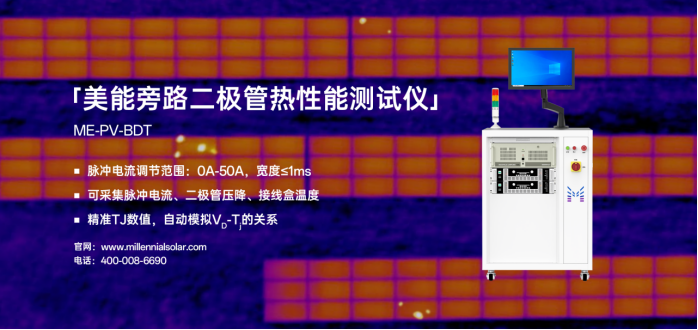
量子效率测试仪
PL/EL一体机
Sinton硅片少子寿命测试仪
Sinton硅块少子寿命测试仪
绒面反射率测试仪
3D共聚焦显微镜
在线四探针方阻测试仪
全自动扫描四探针方阻测试仪
在线薄膜厚度测试仪
晶化率测试仪
Horiba显微共焦拉曼光谱仪
傅里叶红外光谱仪
霍尔效应测试仪
分光光度计
全光谱椭偏仪
Horiba椭圆偏振光谱仪
TLM接触电阻率测试仪
超景深显微镜
网版智能影像测量仪
全自动影像测量仪
卧式拉力机
电池片稳态光衰老化试验箱
电池片紫外老化试验箱
电池片拉脱力综合测试仪
外观检验台
湿漏电测试系统
组件实验室EL测试仪
紫外老化试验箱
稳态光衰老化试验箱
电流连续性监测系统
PID测试系统
旁路二极管测试系统
LeTID测试系统
反向电流过载系统
脉冲电压测试系统
绝缘耐压测试仪
接地连续性测试仪
绝缘耐压接地测试仪
湿热环境试验箱
湿冻环境试验箱
热循环试验箱
动态机械载荷测试机
静态机械载荷测试机
冰雹冲击试验机
引出端强度试验机
霰弹冲击试验机
抗划伤(切割)测试机
剥离试验机
万能材料试验机(单臂)
万能材料试验机(双臂)
光伏玻璃透过率测试仪
醋酸测试试验箱
交联度测试系统
二极管接线盒综合测试仪
落球冲击试验机
半自动四探针
全自动探针式台阶仪
多通道太阳能MPPT系统
Horiba稳瞬态荧光光谱仪
大面积钙钛矿方阻椭偏二合一测试仪
大面积钙钛矿影像显微二合一监测站
钙钛矿P1激光划线测试仪
钙钛矿在线PL测试仪
钙钛矿在线方阻测试仪
钙钛矿在线膜厚测试仪
钙钛矿工艺检测工作站
手持式IV测试仪
便携式EL测试仪
手持热成像测试仪
户外组件多通道测试系统
光伏逆变器电能质量测试仪
无人机EL检测仪
IV测试仪
IVEL分选机
光伏组件热斑效应的产生及防范措施介绍
日期:2024-08-01浏览量:315
旁路二极管是光伏组件中的标准附加件,作用是为了消除错配导致的反向偏置产生的热斑效应,这会导致光伏组件出现功率降低和损坏。因此,一个可靠的旁路二极管器件的设计和对应的检测至关重要。美能旁路二极管热性能测试仪ME-PV-BDT,针对IEC61215标准中旁路二极管功能试验和热性能试验进行测试,搭配美能温度环境箱,评估旁路二极管在高温工作环境中的可靠性,为保护电路稳定、电路的设计和优化以及故障分析提供重要的参考依据。

光伏组件中的错配效应
错配效应,是指互相连接的太阳能电池或组件没有相同的性能,或是工作不在同一条件下进行时出现的现象。当组件中的一片电池的参数与其他的明显不同时,错配现象就会发生。
错配效应造成的影响和功率损失取决于光伏组件中的工作点、电路结构布局以及受影响的太阳能电池的参数。
因为大多数光伏组件都是串联形式,因此串联错配是最常遇到的错配类型。串联错配中又分为短路电流的错配和开路电压的错配,其中短路电流错配是最常见的,也是最严重的。它通常由阴影或电池片自身故障产生。
热斑效应
1. 当光伏组件局部的电池片被树叶、尘土、鸟粪等物体所遮挡;
2. 光伏组件中某片电池本身存在缺陷,发电效率低于其他电池;
3. 组件制造过程中焊接不良以及后期的PID电势诱导衰减效应;
组件的总工作电流一旦超过了这些“问题电池”的短路电流,这些电池的电压将被偏置成负载,从而在组件的内部消耗其他“正常电池”的电能。因此,“问题电池”将转变为耗能部件,并被同一串的电池片产生的能量加热,出现局部过热现象,从而产生热斑效应。

(左)阴影引起(中)电池损坏(右)栅线损坏引起的光伏组件热斑效应
国外某机构进行了3年的光伏组件退化和失效原因调查,进行了性能测试盒分析,总结出有25%的问题原因来自于电池热斑效应。

国外某机构对光伏组件退化和失效原因分布情况统计
如果热斑效应产生的热量过大,则可能导致组件背板出现局部黄变、烧焦、鼓包脱层甚至玻璃破裂的问题现象,严重情况下还会引起火灾。
降低热斑效应的有效方法
通过在每串电池的两端使用旁路二极管,可以有效避免热斑效应对组件造成的破坏。
旁路二极管的工作原理:
二极管与太阳能电池并联且方向相反,在正常工作状态下,每个电池的电压都是正向偏置的,所以旁路二极管的电压为反向偏置,相当于开路,不起任何作用。当串联电池中有一片电池被遮挡或出现错配效应时,电压被反向偏置,此时旁路二极管相当于导线,起到分流作用,其他正常的串联电池所产生的光生电压依然可被外接负载所利用,由此来降低热斑效应对整块光伏组件带来的风险。

旁路二极管避免热斑加热效应工作原理图
因此,一个可靠的旁路二极管器件的设计和对应的检测对光伏组件至关重要。
IEC61215标准——MQT18 旁路二极管试验
MQT 18.1 旁路二极管热性能测试:
加热光伏组件及接线盒至30℃、50℃、70℃、90℃,给旁路二极管施加1ms的脉冲电流(STC条件下的Isc),分别测试其正向压降VD,绘制拟合曲线VD-Tj;加热组件至75℃,在STC条件下Isc通电1h,测各旁路二极管的VD,将电流提升至1.25倍Isc,保持1h。
MQT 18.2 旁路二极管功能测试:
通入正向电流,测试二极管正向压降,确定性能;遮挡组件电池,测量I-V曲线,确定性能。
美能旁路二极管热性能测试仪

联系电话:400 008 6690
美能旁路二极管热性能测试仪ME-PV-BDT采用研华优质工控机,保证设备长期稳定工作。设备兼具热性能测试和热失控测试系统,可施加脉冲电源,脉冲宽度≤1ms,提供正反向切换直流电源。搭配美能环境箱,可做到温度控制。
● 脉冲电流调节范围:0A-50A,宽度≤1ms
● 可采集脉冲电流、二极管压降、接线盒温度
● 精准TJ数值,自动模拟VD-Tj的关系
光伏组件热斑效应虽属于正常现象,但应该尽可能避免,从前期电池片生产到组件制造完成后的检测,从各个环节去减少影响热斑效应发生的概率,包装光伏系统保持良好的功率输出。「美能光伏」凭借先进精密的检验设备,针对IEC61215和IEC61730标准,提供全面的检测服务,帮助制造商提升光伏组件的质量保证。









































































